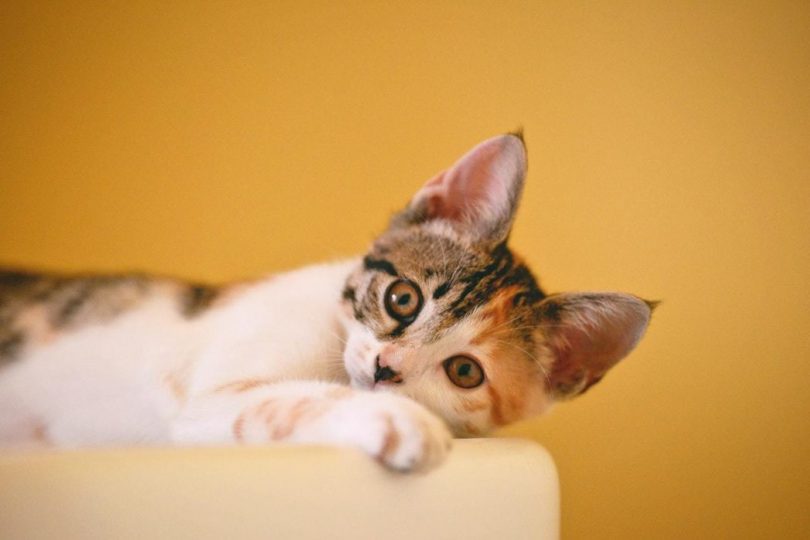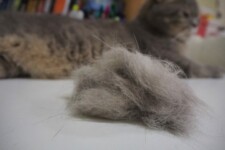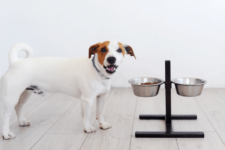Best Food & Remedies For Constipated Cats (Solve The Issue)
Typically, cats usually have one bowel movement per day, and any deviation from that should be a point of concern.
Most often, constipated cats may have three to four bowel movements per week.
Cat constipation refers to the irregular or difficult passage of bowels, mainly because of a problem with its digestive system. The bowels tend to be small, dry and hard, and the cat will strain when taking trips to the litter box.
Such signs may be a potential sign that your cat is experiencing constipation or a more serious problem like a urinary tract disease whose symptoms resemble those of a constipated cat.
A constipated cat often experiences a lot of discomfort and pain, and this may be accompanied by continuous wails while visiting the litter box.
This article takes a look at common causes of cat constipation, along with some food choices and home remedies to help reduce the problem. We have also reviewed some stool softeners, which are useful to relieve your cat’s constipation quickly.

Immediately if you suspect your cat may be constipated, you should visit your veterinarian to have your cat’s health checked.
Your vet will diagnose the condition, and if found to be constipated, the vet will administer medication, and/or recommend that you buy a laxative and transition from their normal diet to one suited to dealing with their constipation condition.
If your cat remains constipated for a long period, they could develop megacolon, an irreversible condition of the colon that may make the situation even worse.
Our website is reader-supported. We research all reviewed products carefully to give you the best choices possible, and if you buy via links on our site we may earn a small commission.
Our Top Picks
| Hill’s Science Hairball Control Cat Food | Editor’s Choice |
| IAMS Proactive Dry Cat Food | Best Seller |
| Royal Canin Feline Fiber Response | Most Popular |
Symptoms Of Constipation In Cats
- Abdominal discomfort.
- Loss of appetite.
- Frequent trips to the litter box that are often unsuccessful.
- Small, dry and hard stools.
- Straining when passing bowels.
- Vomiting.
- Your cat may appear restless.
Causes Of Constipation In Cats
Inadequate Fiber Intake
Fiber is the indigestible portion of plants that makes the stool bulky and easier to transport through the intestinal tract.
Outdoor cats consume wild herbivorous prey that contains undigested matter in the gastrointestinal tract.
Some of the indigestible matter in these prey include hair, skin, and bone, which bulk their stools.
Typically, fiber may be classified into soluble and insoluble fiber.
Soluble fiber (fast-fermenting) soften the stool and allows it to move quickly through the intestines, while the insoluble fiber (slow-fermenting) bulks up the stool and increases its transit time in the intestines.
Dehydration
Inadequate fluid intake is one of the most common causes of cat constipation. Usually, cats have a low thirst for water, despite requiring large amounts of water to support body functions.
A cat’s body is made up of about 70% water, and this means that they require to drink water daily, despite their low urge.
The popularity of dry foods over wet cat food has made matters worse for cats since this type of food contains low moisture.
If your cat’s diet comprises mainly dry kibble, you should provide a water source to compensate for the low moisture content.
If your cat is hesitant to drink water from the normal water bowls, you should use a water fountain to entice your cat to drink more water.
Also, you should switch from a dry kibble to a raw or canned diet.
See our reviews of some stylish and functional ceramic cat water fountains which encourage your cat to drink more
Inactivity
Inactivity is another cause of constipation. Inactive cats have fewer intestinal contractions than active cats, and this causes waste to build up in the intestines.
When your cat is engaging in playful exercises, jumping and hunting, it experiences rhythmic contractions in the intestines and this allows the bowels to move food through the intestines to the rectum.
This inactivity is common among overweight or obese cats, and this causes them to experience constipation more often.
To get your cat playing and exercising more, check out our post about simple cat workout ideas to get your cat up and moving!
Physical Obstruction
Constipation can also occur when there is a physical obstruction in the intestines.
Usually, solid objects such as hairballs, foreign objects, and tumors may block the intestinal tract that moves the waste towards the rectum.
A cat experiencing constipation due to obstruction of the intestinal tract will experience a lot of pain and discomfort at the litter box.
If you cat suffers regularly from hairballs, then check out our home remedies for cat hairballs guide
Best Cat Food for Constipation Reviews
1. Hill’s Science Hairball Control Cat Food
Hill’s Science Adult Hairball Control Recipe is specially formulated with naturally occurring fibers to help remove hairballs.
The fiber also prevents the formation of new hairballs, also helping to prevent constipation and allowing your cat to lead a comfortable active life.
The main ingredients used to make this product are chicken, whole grain wheat, corn gluten meal, pork fat and powdered cellulose.
This meal is idea for adult cats (7 years and older), and is balanced to meet all of your cat’s nutritional requirements.
If you are new to this product, mix increasing amounts of this food with decreasing amounts of the old food over a week or two.
Its caloric content is 328kcal/cup.
Guaranteed Analysis
- Crude protein 29.0% minimum
- Crude fat 17.5% minimum
- Crude fiber 10.0% maximum
- Phosphorus 0.9% maximum
- Sodium 0.5% maximum
2. IAMS Proactive Dry Cat Food
Iams Proactive Specialized Health Care cat food is rich in nutritious ingredients that meet AAFCO’s pet food nutritional profile.
It is also rich in fiber which aids in proper digestion and protects your cat from constipation and hairballs.
This diet also contains antioxidants which maintain a good immune system, and has 10% less fat than original formulas.
It has fewer calories, fat burning L-Carnitine, and a unique blend of carbohydrates which keep your cat full, enabling heavy cats gradually return to a healthier weight.
Designed for adult cats (7 years and above), the crunchy texture of kibble helps keep your cat’s teeth clean and free of tartar.
Guaranteed Analysis
- Crude protein 28% minimum
- Crude fat 11% minimum
- Crude fat 13.5% maximum
- Crude fiber 6.5% maximum
- Crude fiber 6.5% maximum
- Taurine 0.13% minimum
- L- Carnitine 80mg/kg minimum
3. Royal Canin Feline Dry Cat Food
Royal Canin Sensitive Digestion dry cat food is highly nutritious, having a pleasant taste and texture your cat will enjoy.
It is highly digestible, and contains optimal proteins, prebiotics, and psyllium.
The Sensitive Digestion formula is ideal for cats with digestion complications like food intolerance, and allergic reactions to food.
It contains a different combination of fiber which eliminates hairballs and also protects your cat from constipation.
This formula is suitable for the adult stage of life, and has been proven to reduce stool production by 42% in less than ten days.
It has a caloric content of 351 kcal/cup.
Guaranteed Analysis
- Crude protein 36% minimum
- Crude fat 13% minimum
- Crude fiber 3.7% maximum
- Moisture 8.0% maximum
4. Royal Canin Gastrointestinal Fiber Response Dry Cat Food
Royal Canin Gastrointestinal Fiber Response dry cat food contains adequate fiber for effective management of colitis, diarrhea, and constipation.
It is also a balanced diet meal made of protein, fiber and other essential nutrients which supplies all the supplements your cat needs.
It also contains prebiotics, omega-3, and antioxidants all-around health for your feline friend.
Royal Canin Digestive is precisely meant for cats with digestive health issues or food sensitivities, and its optimal blend of both soluble and insoluble fiber helps to maintain healthy digestion, maintaining your cat’s overall well-being.
This cat food requires a veterinary prescription.
Caloric content: 361 kcal/cup
Guaranteed Analysis
- Crude protein 29% minimum
- Crude fat 13% minimum
- Crude fiber 4.7% maximum
- Moisture 8% maximum
- Eicosapentaenoic acid (EPA) 0.18% minimum
- Docosahexaenoic acid (DHA) 0 .08% Minimum
5. Blue Wilderness Adult Chicken Recipe
Blue Wilderness high protein dry cat food is made by blending essential nutrients, minerals, fibers, antioxidants to create a delicious and balanced diet for your cat.
The prebiotics and fiber supports healthy digestion and nutrient absorption, helping your cat to maintain an optimum weight.
It is loaded with Taurine which helps with sustaining good eyesight and a healthy heart, and is a perfect alternative to raw cat diets.
Blue Wilderness is made with real chicken as its main ingredient, and does not contain any grains, wheat, gluten, soy, corn, poultry, or by-products.
This makes it ideal for cats with a sensitive stomach or food allergies.
If moving your cat to this diet, start by mixing 25% of this formula with your old formula, and increase the content gradually over a span of two weeks.
This meal has a caloric content of 435 kcal/cup.
Guaranteed Analysis
- Crude protein 40% minimum
- Crude fat 18% minimum
- Crude fiber 4% maximum
- Moisture 10% maximum
- Magnesium 0.14% maximum
- Taurine 0.15% minimum
If you want to discover more about Blue Buffalo cat food, check out our detailed look at this pet food company and some of their products
Best Laxatives And Stool Softeners For Cats
Apart from buying cat food for constipation, you can also try laxatives or stool softeners that are specially formulated for cats.
When a vet has diagnosed your cat with constipation, they may administer an intravenous injection or recommend a laxative or stool softener to relieve constipation.
Stool Softeners For Cats
These supplements help soften hard fecal matter that makes cats strain while relieving themselves in the litter box.
These softeners are safe to use and are recommended by veterinary as a short-term relief for constipation. Here are best stool softeners for cats:
1. Virbac’s Vetasyl Fiber Supplement
Virbac’s Vetasyl is one of the top-rated stool softeners for cats.
It is made with 100% natural fiber and has no chemicals that may harm your cat.
It is easy to administer and provides a gentle relief from constipation.
Although this stool softener is advertised as a fiber supplement, it does work well in aiding natural elimination.
You can use it in both kittens and adult cats that experience difficulty while passing bowels. It can also be used to soften stool in constipated dogs.
This supplement has 100 capsules that are sprinkled over your cats food.
The recommended dosage is one capsule per 20 lbs. of body weight, but you should receive specific instructions from your vet according to your cat’s condition.
Although most cat owners have successfully used this supplement to soften stool in constipated cats, there are some cat owners whose picky-eater cats refused to eat food sprinkled with this supplement.
2. Pen-Ema Enema for Dogs and Cats
Pen-Ema is a safe treatment for constipation, and it can be used for both cats and dogs.
It is a disposable enema for rectal use that treats cats with a syringe dispenser. It works by stimulating intestinal mucosa that softens the hard fecal matter for easy movement to the rectum.
This treatment contains dioctyl sodium sulfosuccinate in glycerin which stimulates the release of the intestinal mucosa.
One syringe contains 12ml of the treatment, which is administered in a single dose. It can be used in both cats and dogs.
How it Works
It is administered by gently inserting the syringe into your pet’s rectum (remember to lubricate the tip of the syringe to avoid causing damage to your cat).
If you are unsure of how to go about this, request your vet’s assistance in administering the treatment.
Laxatives For Cats
If your cat has not defecated for a couple of days or is experiencing difficulties passing out stool, you can buy over-the-counter laxatives that are approved for felines.
Pet laxatives are classified into either stimulant laxatives or bulk-forming laxatives, depending on how the laxative works.
Stimulant laxatives work by lubricating the digestive tract to make it easier for stool to pass.
They are commonly used when the cause of constipation is a foreign object like hairballs blocking the digestive tract.
Bulk-Forming Laxatives
These types of laxatives work by absorbing water which helps soften dry stool.
This makes bowels movements more frequent, easier to pass through the GI tract, and therefore makes constipation less regular
1. Sentry Herbal Relief For Cats
Sentry Herbal Relief is a popular laxative that is used to eliminate and prevent hairballs.
Hairballs are formed when cats ingest loose hairs during grooming, and these hairs combined to form round-shaped hairballs.
This laxative may come in a gel form or as syrup, but the thick gel is the most common.
Apply it on the cat’s paws, and your cat will continually lick and ingest the gel. This will stimulate the digestive tract, thus allowing the hairballs to pass through.
Alternatively, this laxative may be administered orally or added to the feeding bowls during meal times.
Sentry HC laxative may contain corn or barley syrup that may not be ideal for diabetic cats or cats that are allergic to corn or barley.
The laxative is flavored with barley malt to make it enticing to even the pickiest cats.
Active ingredients:
- Mineral oil
- Petrolatum
- Acacia gum
- Acidified calcium sulfate
- Barley malt syrup
- Caramel
- Glycerin
- Water, etc.
One feature that most cat owners love about this laxative is the long shelf life.
One tube lasts for several months and can be used multiple times to prevent and eliminate hairballs, as long as it has a long expiry period.
2. Lax-Aire Dog & Cat Laxative
Lax-Aire is a popular laxative for constipated cats, and chances are that you have used it or at least heard of it.
It contains cod liver oil as one of its ingredients, and this makes it an ideal choice for picky cats. Cod liver oil is a tasty flavor and is used as a treat for kitties’ taste buds.
Apart from cod liver oil, Lax-Aire also contains petrolatum that helps lubricate the intestinal tract to allow for the passage of stool.
Other ingredients include soybean oil and peptonized iron. It can be used for dogs and cats, and you should follow the recommended dosage depending on your pet.
3. Smooth BM Gold Herbal Constipation Supplement
Smooth BM Gold is an oral solution that is used as a prescription medication to treat constipation in both cats and dogs.
It comes as an unflavored liquid that should be given according to the vet’s prescription and to the pet for whom it was recommended.
This laxative works by increasing the water content in the stool, thereby making them softer and easier to move through the intestinal tract to the rectum.
Some cat owners also use Smooth BM Gold to treat megacolon in their cats.
Home Remedies For Cat Constipation
There are various home remedies that cat parents can try to solve the problem of constipation in their cats.
Water
One of the causes of cat constipation is inadequate water intake. Naturally, cats have a low urge for water and will less likely drink water without being enticed to.
The solution to this is to provide several clean water drink points around the house that your cat can access at any time of day.
If your cat is hesitant to drink from the bowls, try using a ceramic water fountain since your cat will be attracted to the moving water.
Some cats may prefer drinking running water from the sink, and a cat fountain can be a good replacement.
Get some great ideas to entice your cat to drink more water in this article
Switch To A Canned Diet
Switching from a dry diet to a canned meal can also help treat constipation.
Canned or wet cat food has 70% more moisture than dry kibble and this provides enough fluids to help in digestion and easy passage of bowels.
Even with wet food, you should always provide a clean water drinking point.
Add Fiber To Your Cat’s Diet
A cat may also experience constipation due to the lack of or inadequate fiber in their diet.
Fiber works by absorbing water into the GI tract, and this makes the stool bulkier and softer.
This supports normal bowel movement without having to strain or cry out while in the litter box.
You can purchase a specially prepared high fiber diet or add fibers to the cat food. For example, you can add canned pumpkin into the diet.
Another good source of fiber that you can add to the cat’s diet is powdered psyllium. Psyllium is the husk that covers Plantago seed.
It is fiber-rich, and it is used to aid in digestion. Add ¼ to a ½ teaspoonful of psyllium powder to your cat’s diet to help in the easy movement of stool to the rectum.
Trim Long-Haired Cats
Long-haired cats may ingest loose hairs when grooming themselves, and these hairs combine to form a hairball that causes blockage of the intestinal tract.
You should trim your cat’s fur once or twice per year during warmer months.
Cat Exercises
Indoor cats, elderly cats, and overweight cats often lead a sedentary lifestyle, and this results in various health complications such as constipation.
Keep your cats active by creating an environment that encourages them to jump and play around.
If your cat is an indoor cat, you should provide them with cat trees and interactive toys for indoor cats.
Check out our guide on 5 cat workouts that get kitty up and moving
Once you determine that your cat is experiencing constipation, you should consult your vet first to see if your cat needs medical intervention.
FAQs about Feline Constipation
Which cats are at a higher risk of getting constipation?
Constipation is more likely to occur in elderly cats since they are less active and playful compared to the younger “teenage” cats.
However, constipation is not limited to older cats only, and young cats may also get constipation if they are fed a low-fiber diet, are inactive, and don’t drink enough water.
What happens if my constipated cat is not treated?
Continuous constipation places unnecessary pressure on the colon since waste will be packed in the colon for an extended period of time.
This will result in appetite loss, pain and even vomiting due to the weight exerted on the colon.
In extreme cases, the colon can stop functioning and this will affect the cat’s health.
Is constipation a symptom of a more complicated health problem?
Sometimes, constipation may be a symptom of a bigger underlying issue like diabetes or hernia.
This is why you should be on the lookout for any symptoms of constipation, and you should seek your veterinarian’s help immediately you detect the problem.
What can I give my constipated cat to help them poop?
First consult your vet before giving your cat any medications.
The vet may recommend a laxative such as Metamucil, laxatone or Miralax which help soften the cat’s stool.
These laxatives are added to the cat’s meals based on your vet’s feeding instructions.
What should I feed my constipated cat?
The first thing you should do is to transition to a balanced diet that has high fiber, and you should feed them more canned cat food since it is high in moisture.
Is olive oil a safe remedy for a constipated cat?
Olive oil is ideal for small or mild bouts of constipation and should not be used in ongoing care since it’s a plant oil (and cats require animal fat sources).
Add ¼ teaspoonful of olive oil to feeding bowl and mix the olive oil with your cat’s meal.
Other home remedies include coconut oil and canned pumpkin.
Conclusion
Constipated cats go through a lot of discomfort, and this may lead to increased stress levels.
Immediately you suspect that your cat may be constipated, you should take immediate action to help ease your cat’s pains.
The first step you should do is to talk to your vet to determine if your cat is constipated, or there is a more pronounced problem.
The vet may administer an intravenous injection, or recommend you transition to the best cat food for constipation.
Your vet may also recommend over-the-counter stool softeners and laxatives that makes it easy to pass stool through the intestinal tract.
You can also try homemade remedies that prevent and control constipation in cats.













